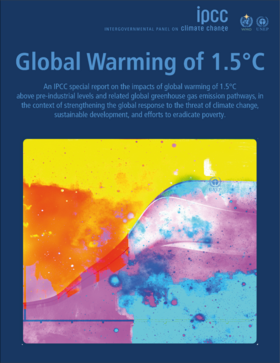IPCC Special Report on Global Warming of 1.5C
The Intergovermental Panel on Climate Change (IPCC) has just released the 1.5°C Special Report (SR15), addressing the impacts of global warming of 1.5°C above pre-industrial levels and related to greenhouse gas emission pathways, in the context of strengthening the global response to the climate change threat, sustainable development, and efforts to eradicate poverty.
Among the main highlights, the SR15 report states human activities are estimated to have caused approximately 1.0°C of global warming above pre-industrial levels, with a likely range of 0.8°C to 1.2°C, and it is likely to reach 1.5°C between 2030 and 2052 if it continues to increase at the current rate (high confidence).
Climate-related risks for natural and human systems are higher for global warming of 1.5°C than at present, but lower than at 2°C. These risks depend on the magnitude and rate of warming, geographic location, levels of development and vulnerability, and on the choices and implementation of adaptation and mitigation options (high confidence).
By 2100, global mean sea level rise is projected to be around 0.1 meter lower with global warming of 1.5°C compared to 2°C (medium confidence). Sea level will continue to rise well beyond 2100 (high confidence), and the magnitude and rate of this rise depends on future emission pathways. A slower rate of sea level rise enables greater opportunities for adaptation in the human and ecological systems of small islands, low-lying coastal areas and deltas (medium confidence).
Model-based projections of global mean sea level rise (relative to 1986-2005) suggest an indicative range of 0.26 to 0.77 m by 2100 for 1.5°C global warming, 0.1 m (0.04-0.16 m) less than for a global warming of 2°C (medium confidence). A reduction of 0.1 m in global sea level rise implies that up to 10 million fewer people would be exposed to related risks, based on population in the year 2010 and assuming no adaptation (medium confidence).
Sea level rise will continue beyond 2100 even if global warming is limited to 1.5°C in the 21st century (high confidence). Marine ice sheet instability in Antarctica and/or irreversible loss of the Greenland ice sheet could result in multi-metre rise in sea level over hundreds to thousands of years. These instabilities could be triggered around 1.5°C to 2°C of global warming (medium confidence).
Increasing warming amplifies the exposure of small islands, low-lying coastal areas and deltas to the risks associated with sea level rise for many human and ecological systems, including increased saltwater intrusion, flooding and damage to infrastructure (high confidence). Risks associated with sea level rise are higher at 2°C compared to 1.5°C. The slower rate of sea level rise at global warming of 1.5°C reduces these risks enabling greater opportunities for adaptation including managing and restoring natural coastal ecosystems, and infrastructure reinforcement (medium confidence).
Climate-related risks to health, livelihoods, food security, water supply, human security, and economic growth are projected to increase with global warming of 1.5°C and increase further with 2°C. There are a wide range of adaptation options that can reduce the risks of climate change (high confidence). There are limits to adaptation and adaptive capacity for some human and natural systems at global warming of 1.5°C, with associated losses (medium confidence). The number and availability of adaptation options vary by sector (medium confidence).
Strengthening the capacities for climate action of national and sub-national authorities, civil society, the private sector, indigenous peoples and local communities can support the implementation of ambitious actions implied by limiting global warming to 1.5°C (high confidence). International cooperation can provide an enabling environment for this to be achieved in all countries and for all people, in the context of sustainable development. International cooperation is a critical enabler for developing countries and vulnerable regions (high confidence).
You can read and download the full IPCC Special Report Global Warming of 1.5°C here.

